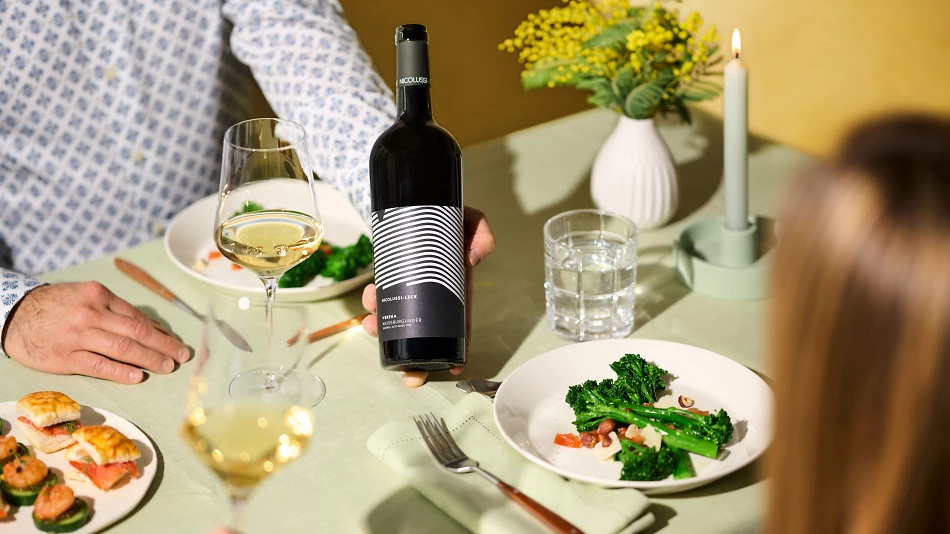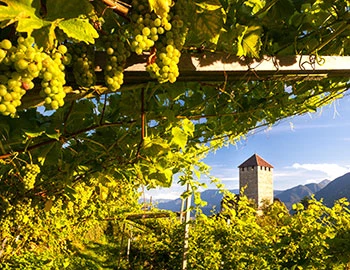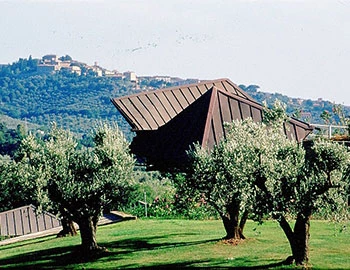Weissburgunder Verena 2022
DOC Südtirol, Nicolussi-Leck, 750 ml

| Grape variety: | Weissburgunder |
| Producer: | Weingut Nicolussi-Leck |
| Origin: | Italy / Alto Adige / Alto Adige |
Description
With the freshness of the Dolomites
The grapes for this South Tyrolean wine get an extra portion of sunshine: they grow on slopes with a gradient of up to 40 per cent high above Lake Kaltern. At the same time, they benefit from the alpine freshness. No wonder the result is such a crystal-clear wine!
Apple and pear on the nose, fresh herbs, yellow fruit, some pineapple and a slightly nutty note. It envelops the palate with freshness and smoothness.
Pinot Blanc is a vegetable lover! Try it with quiche or risotto with spring vegetables. Or treat it to a sea fish in a cream sauce.
Spring in a glass

Discover our «Spring by the glass»: these are refreshing drops that perfectly match the season at reduced prices, valid until 30 April 2025.
Attributes
| Origin: | Italy / Alto Adige / Alto Adige |
| Grape variety: | Weissburgunder |
| Label: | Vegan |
| Ripening potential: | 1 to 5 years |
| Drinking temperature: | 10 to 12 °C |
| Food Pairing: | Seafood salad, Grilled fish, Risotto ai frutti di mare, Vegetable pie, Asparagus specialities |
| Vinification: | pressing the whole grape, fermentation in wooden barrel, fermentation in steel tank |
| Harvest: | hand-picking, strict selection, in small boxes |
| Maturation: | partly in wooden barrel/foudre, partly in steel tank |
| Maturation duration: | 10 months |
| Volume: | 13.5 % |
| Note: | Contains sulphites |
Weingut Nicolussi-Leck
The Kreithof, as the ancestral estate is known, is located near the idyllic Lake Caldaro in South Tyrol (Alto Adige) and has been cultivated by the Nicolussi-Leck family since 1915. Standing guard over it are the medieval ruins of Leuchtenburg Castle, which – like the estate – dates back to the 13th century and was presumably also associated with nearby Laimburg Castle in the Etsch Valley.
Today, the winery is run by Jakob Nicolussi and his wife Stephanie with his parents’ support. Around 5 hectares lie between the lake and Leuchtenburg. There are east, south and west-facing slopes at about 350 metres above sea level, some with a gradient of up to 40% and warm, loamy soils and the porphyry rock of Mitterberg mountain. Each vineyard or plot of land has its own unique microclimate and soil composition that distinguish it from the others. This diversity was used to select the ideal location for each grape variety.

Alto Adige
Alto Adige: Alpenweine mit südlichem Charme
Am Alpenübergang gelegen verfügt das Südtirol über eine grosse Palette an Mirkroklimata und Bodentypen. Dies macht es möglich, dass hier über 20 verschiedene Sorten optimale Bedingungen vorfinden. Vernatsch, Lagrein und Gewürztraminer gelten als alteingesessene Südtiroler Gewächse, doch auch die Familie der Burgundergewächse finden hier ideale Bedingungen vor. In wichtigen Weinführern wie etwa dem «Gambero Rosso» erhält das Südtirol regelmässig die meisten Höchstbewertungen («Tre Bicchieri») im Verhältnis zur Rebfläche in ganz Italien.

Italy
Italy – Where wine is a way of life
The Italian wine regions are extremely diverse, and this is made clear in their wines. Established varieties such as Merlot, Syrah, and Sauvignon can be found on just 15 percent of the total vine growing area. The remaining 85 percent is reserved for autochthonous, indigenous varieties. More than 2,000 different grape varieties are grown under diverse conditions and pressed with various techniques into wines that reach the top tier of the international wine market.



